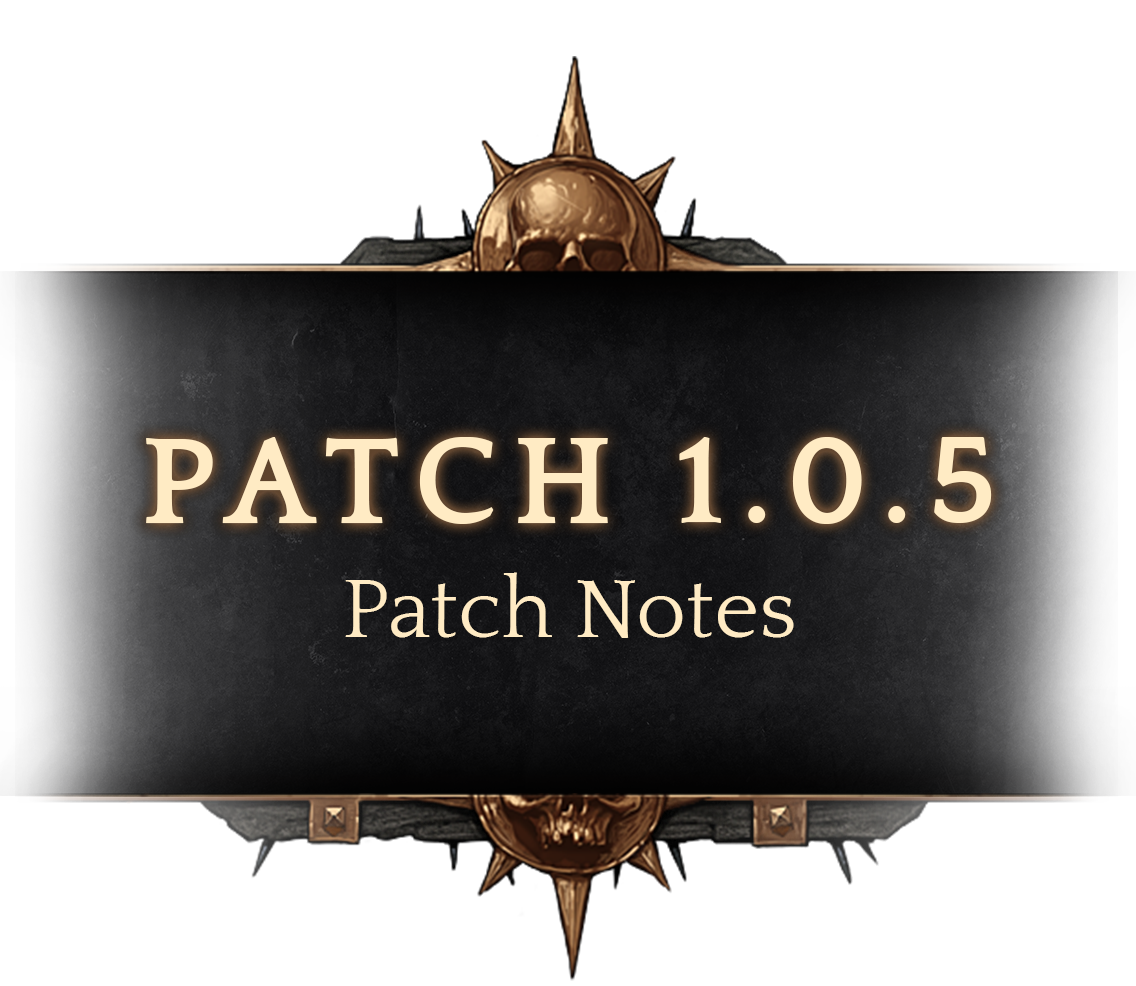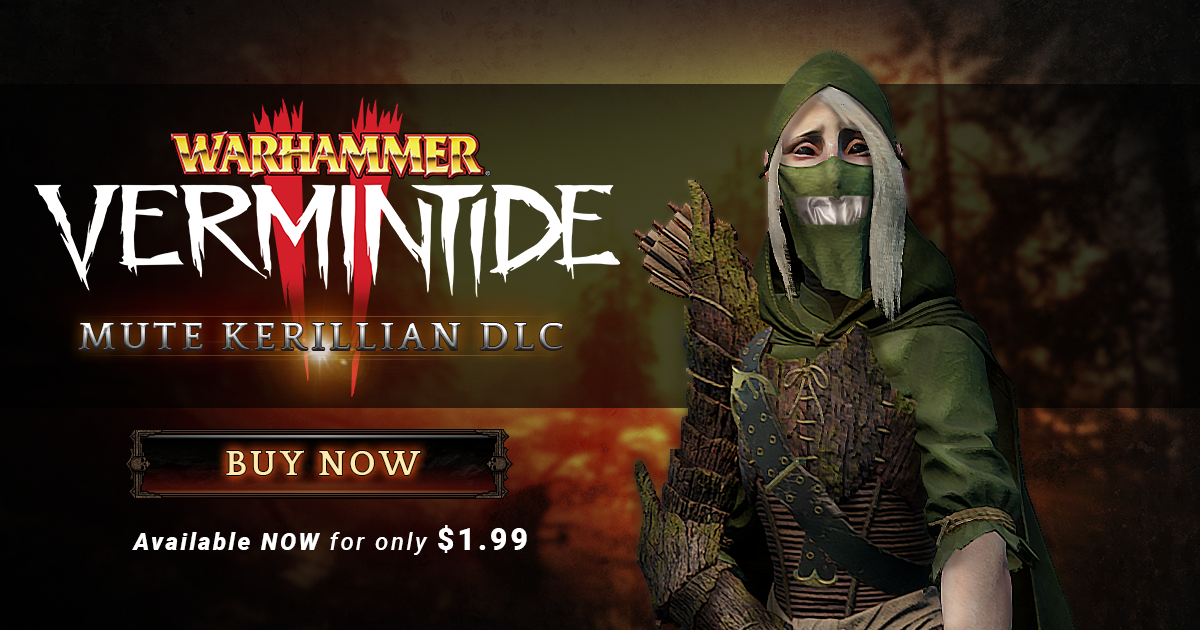

Welcome to Patch 1.0.5 for Vermintide 2!
Version 1.0.5 introduces large changes to combat balance. In order to maintain a close-combat focused game, some enemies are now more resistant to staggering. All weapons have also had their cleave tweaked in order to make some weapons more viable than others, against large hordes of enemies. These balance adjustments to stagger and cleave will have a more significant impact on Champion and Legend.
We would like to extend our sincerest gratitude to all of our players who participated in the balance beta for version 1.0.5 over the weekend. We've listened to your feedback and adjusted accordingly. We feel that the balance in the game now is in a better state, and that is much due to your dedicated feedback.
Going forward, we'll keep a close eye on balance and will continue making changes and adjustments to all areas of play, in order to make this all fair and balanced.
- Chest rewards from Veteran difficulties will be capped at 300 Hero Power, up from 200.
The higher difficulty levels - Champion and Legend, are meant to really test the skill of the player."
- Veteran item rarities have been changed. You can now receive Veteran items from General’s Champion and Emperor’s Champion chests, as well as any chests obtained from Legend. Their drop rates have also been drastically increased.
- We’ve changed how Hero Power is capped per difficulty.
- On Champion and Legendary, your Hero Power isn’t capped at all.
- On Recruit, Hero Power above 200 will be subject to scaling. Hero Power between 200 and 600 will be interpolated toward a maximum of 300.
- On Veteran, Hero Power between 400 and 600 will be interpolated toward 500.
- On Champion and Legendary, your Hero Power isn’t capped at all.
- Scaling has been tweaked for damage and cleave (using a 3.5 ratio rather than 3.0).
- Fixed an issue which caused projectiles to not properly trigger hit or crit procs from traits and talents for clients.
- Fixed an issue where the equipment trait Heroic Intervention wouldn’t function properly on clients.
- On Champion and Legend, the Director will less frequently spawn hordes and specials while the players still are engaged with enemies.
- Ranger Veteran:
- Last Resort: Increased power boost when out of ammo to 25%, up from 15%.
- Ironbreaker:
- Oi! Wazzok!: Fixed to now more reliably taunt bosses.
- Slayer:
- See it Coming: Increased dodge range increase to 20%, up from 10%.
- Oblivious to Pain: Max damage taken threshold decreased to 10, down from 15.
- Stunty Saviour: Increased movement speed on last hero standing to 15%, up from 5%.
- Unstoppable!: Increases passive buff duration to 5 seconds, up from 3.
- See it Coming: Increased dodge range increase to 20%, up from 10%.
- Mercenary:
- Desperate Defiance: Increased damage reduction to 35%, up from 25%.
- Reikland Reaper: Increased power boost to 15%, up from 10%.
- Desperate Defiance: Increased damage reduction to 35%, up from 25%.
- Huntsman:
- Scavenger: Increased ammunition regained on boss death to 100%, up from 30%, of max ammo.
- Makin' It Look Easy: Increased critical strike chance after scoring a headshot to 25%, up from 10%.
- Thrill of the Hunt: Increased reload speed after scoring a headshot to 35%, up from 20%.
- Hunter’s Respite: Fixed an issue where the health regeneration from the talent only worked for host players. Now it properly works for both hosts and clients.
- Hunter's Prowl: Cooldown reduced to 90 seconds, down from 120.
Foot Knight:- Bulwark: Increased block and push angle to 50%, up from 30%.
- Scavenger: Increased ammunition regained on boss death to 100%, up from 30%, of max ammo.
- Waystalker:
- Daughter of the Hunt: Now activates while above 45% health, up from from 25%.
- Kurnous' Blessing: Fixed an issue where Trueflight Volley returned more ammo than intended. Now returns 20% ammo, down from 50%.
- Trueflight Volley: Will now present her equipped bow, instead of showing a plain longbow, when activated.
- Daughter of the Hunt: Now activates while above 45% health, up from from 25%.
- Handmaiden:
- Wraithwillow Stance: Increased push and block angle to 50%, up from 30%
- Shadowstep: Increases dodge distance to 20%, up from 10%.
- Hulon's Tenacity: Increased stamina regeneration rate to 50%, up from 30%.
- Wraithwillow Stance: Increased push and block angle to 50%, up from 30%
- Shade:
- Shadowstep: Increases dodge distance to 20%, up from 10%.
- Infiltrate: Cooldown reduced to 60 seconds, down from 120.
- Shadowstep: Increases dodge distance to 20%, up from 10%.
- Fixed an issue where the Righteous Hatchet weapon skin displayed the wrong icon.
- Witch Hunter Captain:
- Charmed Life: Increased dodge distance to 20%, up from 10%.
- Marked for Death and Wild Fervour: Fixed an UI issue where the buff icon would not appear when a taggable target was killed - even though the buffs were applied.
- Charmed Life: Increased dodge distance to 20%, up from 10%.
- Bounty Hunter:
- Necessary Means: Increased power boost when out of ammo to 25%, up from 10%.
- Blessed Shots: Fixed an issue where its cooldown would be incorrectly reset by ranged attacks when swapping to a melee weapon before the projectile hit.
- Necessary Means: Increased power boost when out of ammo to 25%, up from 10%.
- Zealot:
- Flagellant: Max damage taken threshold decreased to 10, down from 15.
- Suppress Pain: Increased damage reduction to 35%, up from 25%.
- Pleasure from Pain: Fixed an issue where this would replace the attack speed increase from Holy Fervour.
- Flagellant: Max damage taken threshold decreased to 10, down from 15.
- Battle Wizard:
- Cauterize Wounds: Increased healing received to 30%, up from 20%.
- Burnout: Fixed an issue where attack speed debuffs where not removed when clearing Overcharge.
- Fire Walk: Cooldown reduced to 40 seconds, down from 90.
- Cauterize Wounds: Increased healing received to 30%, up from 20%.
- Pyromancer:
- Exhaust: Fixed an issue where attack speed debuffs where not removed when clearing Overcharge.
- Bonded Flame: Fixed an issue where the talent description and actual amount of health regained did not match up. Now correctly displays and grants 20 temporary health, where it previously stated 10, but gave 35.
- Exhaust: Fixed an issue where attack speed debuffs where not removed when clearing Overcharge.
- Unchained:
- Backblast: Increased push and block angle to 50%, up from 30%.
- Dissipate: Increased venting damage reduction to 50%, up from 25%.
- Conduit: Increased vent rate to 50%, up from 25%.
- Backblast: Increased push and block angle to 50%, up from 30%.
Enemies
- Marauders have had their cleave hit mass reduced by 25% (they’ll be easier to cut through and hit an additional target).
- Blightstormer and Lifeleech Sorcerers are now considered unarmored, and have been given a headshot hitzone.
- Blightstormer Sorcerers have had their health reduced by a third.
User Interface
- Updated the anti cheat panel to clearly show the untrusted state and reason if not trusted.
- Fixed temporary health degeneration to incorrectly being tallied in the Damage Taken statistic in the Score Screen.
- Traits and Properties can now be re-rolled on equipped items.
- The bar under a team member’s portrait showing their available ammunition didn’t make sense for all heroes. So we replaced it with something more useful - showing that hero’s ability bar.
- When a team member’s ammunition is less than a third, they will show a yellow icon next to their portrait. When they run out of ammunition, they will show a red icon next to their portrait.
- Fixed erroneous translations and missing subtitles for all languages.
Levels
- Fixed an issue on Righteous Stand where double bosses and patrols might spawn near the end towards the temple.
- Fixed an issue on Empire in Flames where Stormvermin patrols could get stuck on a ledge near the beginning of the level.
- The number of roaming elites have been slightly tuned down on Champion and Legend.
- We’ve fixed some weapons that were using single target priority while not being single target attacks. This caused some swings to ignore other targets hit during the same frame as the aimed target. The affected weapons are Sienna’s Mace, Kerillian’s Elven Spear, Glaive, Dual Swords, and Sword and Dagger, Kruber’s Executioner Sword, and Halberd.
- We fixed ranged weapon switch priority. If a weapon switch is triggered, it should enter the input queue with the highest priority. Which means that pressing ‘Q’, following by an instant RMB to go to “panic-block-mode” should work better now.
- Increased speed of fire for Elven Repeating Crossbow slightly. The next attack can be chained after 0.5 seconds, reduced from 0.6 seconds.
- Fixed the Beam Staff which sometimes incorrectly saved the number of consecutive hits between attacks. This caused an unintentional damage increase.
- Dual wielded swords have had their headshot multiplier increased.
- Stagger and cleave thresholds on Legends set to match Champion values.
- Stagger and cleave thresholds have been tweaked for all enemies to more evenly match power scaling across difficulties. This affects nearly all types of weapons.
- Added a boost to stagger strength on headshots.
- Reduced friendly fire multiplier to 0.1 on Champion, down from 0.25.
- Reduced friendly fire multiplier to 0.25 on Legend, down from 0.5.
- Critical strike effectiveness is now added later in the damage bonus calculation. Which means it will have a higher impact, especially on headshots.
- Added an attack intensity threshold of 10 to Legend. This is a limit on the amount of consecutive attacks a player can receive before given a brief grace period to act.
- Fixed a crash when leaving a game while carrying an item from that level, like a barrel or a cannon ball.
- Fixed a rare crash when hitting a dismembered body part as client.
- Blood Loss: Changed to target a single player instead of the whole team. Increased duration to 60 seconds, from 20. Health lost tweaked to reflect this.
- Blessing of Regeneration: Increased duration to 60 seconds, from 30. Health regenerated tweaked to reflect this.
- Curse of the Rat: Increased duration to 60 seconds, from 20.
- Guns Blazing: Increased duration to 60 seconds, from 30. Now also gives full ammunition when triggered.
- Boon of Concentration: Increased duration to 60 seconds, from 10. Buff effect tweaked to reflect this.
- Boon of Speed: Increased duration to 60 seconds, from 10. Buff effect tweaked to reflect this.
- Boon of Strength: Increased duration to 60 seconds, from 20. Buff effect tweaked to reflect this.
- Cruel Hooks: Increased number of Packmasters to 3, from 2.
- Gunline: Increased number of Ratling Gunners to 4, from 3.
- Kill it with fire!: Increased number of Warpfire Throwers to 4, from 3.
- Gratuitous Violence: Removed from voting pool. The game is gratuitously violent enough as it is.
The following notes were added after publication:
- These balance adjustments to stagger and cleave will have a more significant impact on Champion and Legend.
- Veteran item rarities have been changed. You can now receive Veteran items from General’s Champion and Emperor’s Champion chests, as well as any chests obtained from Legend. Their drop rates have also been drastically increased.







